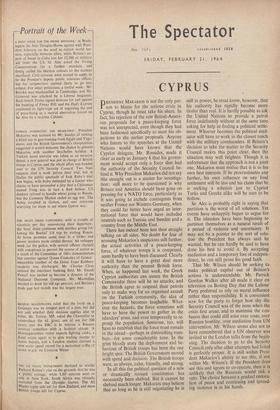CYPRUS
PRESIDENT MAKARIOS is not the only per- son to blame for the serious crisis in Cyprus, though he must take his share. In fact, his rejection of the new British-Ameri- can proposals for a peace-keeping force was not unexpected, even though they had been fashioned specifically to meet his ob- jections to the earlier proposals. Anyone who listens to the speeches at the United Nations would have known that the Cypriot delegate, Mr. Rossides, made it clear as early as January 6 that his govern- ment would accept only a force that had the authority of the Security Council be- hind it. Why President Makarios did not say this straight out is a matter for investiga- tion : still more to be questioned is why Britain and America should have gone on pressing for a NATO force, particularly as it was going to include contingents from neither France nor Western Germany, when they could far better have urged an inter- national force that would have included neutrals such as Tunisia and Sweden and a country from the Middle East.- There has indeed been less than straight talking on all sides. No doubt for fear of arousing Makarios's suspicions still further, the actual activities of a peace-keeping force, of whatever troops it is comprised, seem hardly to have been discussed. Clearly it will have to have a great deal more authority than the present British force. When, as happened last week, the Greek Cypriot authorities can assure the British Commander there will be no attacks, and the British agree to suspend their patrols only to make way for an organised assault on the Turkish community, the idea of peace-keeping becomes laughable. What- ever the hazards, the force sometime will have to have the power to gather in the islanders' arms, and even temporarily to re- group the population. Someone, too, will have to establish that the force must remain in the island—perhaps in diminishing num- bers—for some considerable time. In the grim bloody story the deployment and be- haviour of British troops has been the one bright spot. The British Government moved with speed and decision. The British troops were, as always, calm, friendly, and strong.
In all this the political question of a new or drastically revised constitution has necessarily been shelved. But it cannot be shelved much longer. Makarios may believe that so long as he is still negotiating he is still in power; he must know, however, that his authority has rapidly become more titular than real. It is hardly possible to ask the United Nations to provide a patrol force indefinitely without at the same time asking for help in finding a political settle- ment. Whoever becomes the political med- iator will have to work in the closest touch with the military commanders. If Britain's decision to take the matter to the Security Council makes this point clear, then the situation may well brighten. Though it is unfortunate that the approach is not a joint one, Makarios must realise that it is in his own best interests. If he procrastinates any further, his own influence on any final settlement will be less and his claim that he is seeking a solution just to Cypriot Turks and Greeks alike will be seen to be hollow.
Sir Alec is probably right in saying that partition is the worst of all solutions. Yet events have unhappily begun to argue for it. The islanders have been beginning to partition themselves as a natural result of a period of violence and uncertainty. It may not be a pointer to the sort of solu- tion the President has always said he wanted, but he can hardly be said to have done his best to avoid it. By accepting mediation and a temporary loss of indepen- dence, he can still prove his good faith.
That Mr. Wilson should be seeking to make political capital out of Britain's actions is understandable. Mr. Patrick Gordon Walker after all made it clear on television on Boxing Day that the Labour Party preferred to rely on moral influence rather than responsibility. It is convenient now for the party to forget how shy the Security Council was of the issue when the crisis first arose, and to minimise the con- fusion that could still arise over costs, over Russian hostility, over mediation from UN intervention. Mr. Wilson seems also not to have remembered that a UN observer was invited to the London talks from the begin- ning. The decision to go to the Security Council only after other attempts had failed is perfectly proper. It is still within Presi- dent Makarios's ability to see this, if not within Mr. Wilson's. If the President does see this and agrees to co-operate, then it is unlikely that the Russians would risk a veto. The choice between a gradual restora- tion of peace and continuing and spread- ing violence is in his hands.






































 Previous page
Previous page